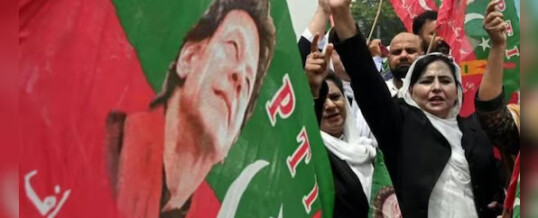
McLeod Group blog by Rhonda Gossen, February 21, 2024
The general elections in Pakistan on February 8 shocked those who had written off the banned party of the jailed former prime minister Imran Khan. Over half of the 60 million voters selected candidates backed by his Pakistan Tehreek-e-Insaf (PTI) party – an unprecedented as well as unexpected outcome after months of repressive measures against the party, particularly since Khan’s arrest on May 9 last year. Despite PTI being excluded from the list of parties eligible to identify their candidates on the ballot, they received more seats than any other party. The “massive turnout of youth and women voters made the difference”, argued one analyst.
More than half of the 20.3 million new registered voters were women. The 12.5 million newly registered female voters (since 2018) was “unprecedented“, according to the National Commission on the Status of Women and UNDP Pakistan. UNDP stated just days before the election that this “underscores a potential change in voter dynamics but also marks a significant stride towards gender inclusivity in the electoral process”. This prediction rang true, as noted by the Women’s Action Forum Lahore, a longstanding women’s rights group, which said that “the elections demonstrated that the will of the people cannot be denied, that women’s vote is critical, and voters are willing to vote them in”.
The February 8 vote was a call for reform, some calling it a near revolution, with the PTI-backed candidates emerging as symbols of resistance against the political status quo and the military’s involvement in politics. For over half of its existence since 1947, Pakistan has been under direct army rule. As the Pakistan Muslim League–Nawaz and the Pakistan People’s Party form a new coalition without PTI, replicating the one in place since Khan’s ouster as Prime Minister in 2022, the anticipated change by the female and youth voters is in doubt. “It was a vote for hope and democracy. But the people’s mandate seems to have been stolen yet again”, wrote author and journalist Zahid Hussain.
The Election Commission of Pakistan has formed a committee to investigate rigging allegations amidst ongoing protests over election fraud allegations. Canada condemned the incidents of electoral violence as attacks on democracy, along with the United States, UK and Australian governments. Thirty US Members of Congress and the UN Secretary General have demanded independent investigations into irregularities committed by officials and rivals of PTI. Uncertainty still looms.
If, as international affairs expert Valerie Hudson and her colleagues have found, “nearly every dimension of national security is intertwined with whether women are subordinated or empowered within their society”, then the level of gender equality in Pakistan will be an important factor in policies to stabilize the economy and internal security. Pakistan has long remained close to the bottom on the World Economic Forum Gender Equality Index of 146 countries.
With the biggest gap showing in economic opportunities for women, policies and programs aimed at transformative change in women’s economic empowerment need support, including from foreign partners like Canada. With the current economic crisis and skyrocketing inflation, the poorer segments of society (including women and youth) are likely to feel the effects the most. Close to 40% of the population is living in poverty. Despite considerable efforts in women’s economic empowerment programming, much more is needed to transform the levels of poverty faced by millions.
Pakistan is also rated among the worst performers by the Women, Peace and Security Index. In 2019, it ranked fourth from the bottom, above Yemen, Afghanistan and Syria. The thorny issue of violent religious extremism has negatively impacted gender equality in the country. In a major step forward, under the government of Imran Khan from 2018 to 2022, Pakistan took bold progressive steps to integrate a gender perspective into national security and countering violent extremism policies.
Under his government, Pakistan’s National Internal Security Policy (NISP) recognized the signs of domestic violence against women as a major impediment to preventing violent extremism and included a broader definition of security that integrates a gender perspective. The NISP advocates for women’s empowerment and the provision of equal opportunities in education and employment, partially as a strategy to counter extremism. Canada’s engagement and policy dialogue with the new government should encourage the strengthening of such policies.
The election raises questions about the future of Pakistan’s democracy, for society, for the economy and the state of civilian-military relations. If as recent feminist analysis indicates, stability and progress also depend on improvements in the equality of women, then the prescription is clear. Canada and other partner countries should continue to strengthen support for the advancement of gender equality.
Rhonda Gossen is a former Counsellor for international cooperation at the Canadian High Commission in Islamabad and a senior advisor on development and crisis for UNDP and UNHCR. Her book on Pakistan is forthcoming from McGill-Queen’s University Press. With input from author and analyst, Imtiaz Gul in Islamabad. Image: Bangkok Post.
